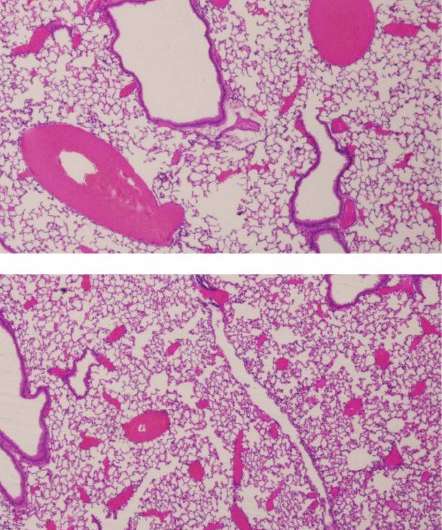Blocking gene expression improves outcomes in blood disease in models

Scientists successfully reduced the symptoms of a blood disease called myeloproliferative neoplasm in mouse models by interrupting an important regulatory pathway, according to a Northwestern Medicine study published in the Journal of Clinical Investigation.
Myeloproliferative neoplasm (MPN) is a bone marrow disease characterized by overproduction of blood cells. While it sometimes leads to cancer, blood clots are a major cause of mortality and morbidity in the disease, according to senior author Peng Ji, MD, PhD, associate professor of Pathology. Baobing Zhao, PhD, a postdoctoral fellow in Ji's lab, was the lead author.
Many MPN patients with clots in a blood vessel—thrombosis—have a mutation in a protein-encoding gene called JAK2. One popular treatment inhibits the function of that mutated gene, but high doses of those drugs can cause anemia or low platelet count, as JAK2 is essential for blood cell production. Consequently, Northwestern Medicine scientists have been exploring other therapeutic pathways, Ji said.
One such pathway involves another gene, Pleckstrin-2, previously shown to be involved in red blood cell production. Ji and his colleagues discovered the gene was upregulated in MPN patients with the JAK2 mutation, presenting a therapeutic target.
"We wanted to use a genetic model to find out if Pleckstrin-2 had an impact on disease development," said Ji, who is also a member of the Robert H. Lurie comprehensive Cancer Center of Northwestern University.
He and his collaborators created a mouse model with the Jak2 mutation and then turned off Pleckstrin-2. They found it drastically reduced blood clots and extended survival in the model.
"The risk of thrombosis was not completely cured because there are other factors aside from pleckstrin2, but we saw a very dramatic amelioration in blood clotting," Ji said. "No factor of Jak2 has shown this rescue of lethality before."
Next, Ji hopes to turn this discovery into an actionable therapy. He has begun generating a drug-based inhibitor for Pleckstrin 2 in hopes that it would have milder side effects when compared to the Jak2 inhibitor drug.
"We are looking for a molecule that can bind with Pleckstrin2 and block its functions. We've already screened compounds, and we have about 40 we are testing right now," Ji said. "Mice with pleckstrin2 deactivated experienced fewer side effects compared to mice without Jak2, so we believe the Pleckstrin-2 inhibitor will generate fewer side effects as well."
More information: Baobing Zhao et al. Loss of pleckstrin-2 reverts lethality and vascular occlusions in JAK2V617F-positive myeloproliferative neoplasms, Journal of Clinical Investigation (2017). DOI: 10.1172/JCI94518

















